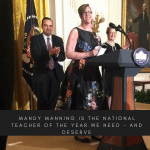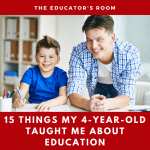A staple of democratic society is the ability to civilly converse with those of like and unlike mind. At least, that’s the idea. These days politicians on both sides of the aisle rarely agree on anything, and their communication style is anything but civil. Viewpoints are dismissed with prejudice, and compromise is unattainable.
While there is little we can do to remedy the current politicians in office, there is something we can do about our future generations; we can teach. We can share a fair and balanced view of issues with the students, and then in turn model with them how to civilly debate their points of view with one another. Doing so will help create a knowledgeable society who can work together despite their differences. At least, that is the idea. And it might just work…
That is, until someone runs interference.
Let me share a tale of two teachers at my school to illustrate the disruptive nature of interference within the classroom. Their names have been changed to protect their identities.
Penelope Dawson assigned her AP students to analyze an opinion piece as she had several times before. She chose an op-ed that was written in favor of Planned Parenthood, an organization that Penelope has neither supported nor criticized in front of her students. Soon after assigning the piece to her students, a parent contacted her via email and accused her of presenting biased material meant to persuade her students to support one side and one side only. (Please note, however, that the student did not feel that way; the student was not even aware that an email was sent on his or her behalf.) Despite Mrs. Dawson’s best and polite efforts at explaining to the parent that this was not her intent, the parent held firm to her allegation that Mrs. Dawson was corrupting her child’s mind. This parent simply does not understand the nature of the assignment her child had been given.
The nature of Mrs. Dawson’s assignment prepare was to prepare students for both the state assessment and AP exam, but more importantly, it teaches students to think about what they are reading. The process is best done without emotion; analyzing does not require one to agree with the text one is reading. It does, however, require one to analyze objectively, to seriously consider the points an author submits regardless of how one feels about such points. Effective teachers choose a variety of articles on a variety of topics from a variety of perspectives. This is not a platform for teachers to impose their own beliefs and views on the students. After all, a teacher’s job is to teach students how to think (i.e. analyze), not what to think. Mrs. Dawson is an effective teacher; Mrs. Dawson has no interest in indoctrinating the students who grace her classroom. Mrs. Dawson keeps her views to herself, in fact; had she shared her views with her students, they would have been puzzled as to why she chose the particular article that put her in the hot seat with one parent.
Another teacher, Michael Delaney, found that his students had finished an assignment early and decided to reward them with a language arts game. He chose “Finish Lines” (or something similar) in which students had to finish famous quotes after being given the first part. Many of the quotes were taken from movies, television, and novels. It was all fun and games for the students until Mr. Delaney pulled a card with a quote from the bible. Nothing was said at the time, and students finished the game without incident. It was a day later when Mr. Delaney received an email from a concerned parent.
This parent, who was so fearful that Mr. Delaney would take retribution against his or her child that they chose to remain anonymous, accused him of quoting scripture in class. Apparently, the student went so far as to say that Mr. Delaney had pulled out a bible and read straight from the sacred text. Of course, Mr. Delaney explained the true version of events to the parent, but the parent persisted in pursuing the separation of church and state, certain that Mr. Delaney had somehow violated that. Anyone who knew Mr. Delaney would find this accusation laughable and ridiculous. Thankfully, Mr. Delaney never heard from the parent again after deciding to drop the issue and continue about his business, which was the business of teaching.
In both these incidents, concerned, well-meaning parents attempted to censor content in teachers’ rooms without even speaking to them about said content. They operate under the misguided notion that by filtering their children from viewpoints they disagree with that they are protecting them. Ironically, their attempt at shelter will most probably cause more harm than protection.
Students who only have an understanding of one side of an issue will be ill-prepared to defend their beliefs or challenge the flaws they find with opposing points of view when opponents attack. In fact, these same students will become flustered and may even start to doubt the very beliefs that their parents sought to secure by pretending the other side doesn’t exist. Doubts that are not confronted are doubts left to fester unchecked.
Students who ignore biblical literature will sit at a loss when they are expected to independently analyze a Western author who alludes to the bible, as several of them do. Simply hearing a verse of scripture will not damage a child irrevocably, nor is it a defiance of church and state separation. Rather, even non-believing professors admit the importance of learning key biblical events even if only for the sake of studying literature or understanding the origins of certain laws.
Censoring content, for the most part, is a grave disservice to our students. Unless the teacher is introducing inappropriate subject matter (e.g. sharing Holocaust pictures to kindergartners or teaching sex ed in an algebra class without parental consent or something equally absurd), parents should step away and let the teacher teach. Unless the teacher is clearly trampling on their pupils’ beliefs or is pushing their own beliefs in the classroom, parents should remain calm and stand down. There is nothing to stop parents from reviewing the content and discussing their take on things with their children in the comfort of their own homes; in fact, most teachers wish parents would take a more active role in such things and offer their children guidance.
In the meantime, stop censoring our classrooms. Better informed students make for a better informed society over all; willful ignorance, on the other hand, is a disease that educators hope to eradicate.





